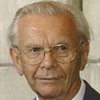Hello Visitor! Log In
Herwig Schopper
Schopper, Herwig
 |
Schopper, HerwigFormer Director General, CERN; Member, Board of Trustees, WAAS |
Job Title
Former Director General, CERN; Member, Board of Trustees, WAAS
Herwig Schopper is the former Director General of the European Organization for Nuclear Research (CERN), Geneva, Switzerland and former Director of the Deutsches Elektronen-Synchrotron (DESY), Hamburg. His fields of work include Optics, Nuclear Physics and Elementary Particle Physics. He has held various professorships in Germany and has been involved in directing several research institutes at the national and international scales. He is a member of the Board of Trustees of the World Academy. He is also Fellow of the Institute of Physics, London, UK; the American Physical Society; and various academies.
ARTICLES BY THIS AUTHOR
Global Transformative Leadership in the 21st Century: A Science, Engineering, Technology Integrated and Strategic Perspective
( International Organizations ), ( New Paradigm ), ( Knowledge, Science & Values )
Get Full Text in PDF
Abstract
The goal of this paper is to focus on the Global Leadership Challenge in the 21st Century with an integrated and strategic perspective in science, engineering and technology (SET). “In any crisis, leaders have two equally important responsibilities: solve the immediate problem and keep it from happening again. The COVID-19 pandemic is a case in point. We need to save lives now while also improving the way we respond to outbreaks in general. The first point is more...
Scientific Knowledge and the Citizen
( International Organizations ), ( Knowledge, Science & Values )
Get Full Text in PDF
Abstract
How can citizens become more aware of science and how it proceeds in order to be able to form their own opinion on science based problems concerning our environment and thus participate in taking decisions relating to technical matters? Scientific knowledge is also part of human culture and contributes to the evolution of human values like faith. What role can scientific academies play in improving the trust between the public and science?
It is...
